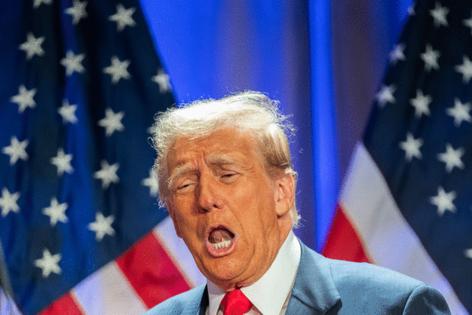Matthew Yglesias: If Trump dismantles the Education Department, he'll regret it
Published in Op Eds
After winning the presidency by focusing on immigration, inflation and a vague notion that life was better in 2019, Donald Trump is widely expected to proceed with plans to … eliminate the Department of Education. It’s hard to see how this makes sense — for him, his party or the country.
The Department of Education is not above criticism, especially its policies concerning student loan relief and student discipline. But it mostly does boring stuff like administering grants that support disabled students or school systems with a lot of poor children. And it’s not a major line item ($238 billion) in the federal budget ($8.7 trillion). If the president-elect wants to seriously reduce federal spending, he needs look at either the military or programs for the sick and elderly.
But if it’s not about the money, then what is it about? It can’t really be about efficiency, Elon Musk’s DOGE notwithstanding, since disappearing Cabinet departments — or creating them — never seems to make much difference.
It’s easy to imagine eliminating, say, the Commerce Department, and parceling out its functions across Treasury, Interior and Labor. But what would this fix? A similar question applies to Congress’s creation of the Department of Homeland Security after 9/11. This new Cabinet-level department pulled various immigration functions out of Justice, poached the Secret Service from Treasury, took aviation security from Transportation, rolled them all together with FEMA, and — tada, new agency!
So if Trump’s goal is just to redraw the lines on some federal bureaucratic org charts, it will be a waste of time, but a harmless waste of time.
It’s generally not productive to delve too deeply into Trump’s motivations — his love of chaos explains a lot of his behavior — but the desire to dismantle the Education Department is evidence of a larger impulse on the right that deserves further inspection: addressing the problems of public education through relentless decentralization. This is a path which leads to the federal government retreating from its role, state governments turning school management over to localities and, ultimately, to privatizing the whole enterprise.
Is this an agenda Americans are going to support? Mark me down as a skeptic. Democrats blundered away their historic role as the party trusted on education with prolonged school closures during COVID. Overreaching on privatization will blow back on Republicans.
More broadly, the view of the Department of Education as a source of malign leftist influence is in critical respects backwards. Under President Joe Biden, the department was not shutting down gifted and talented programs or telling students that “worship of the written word” is an aspect of white supremacy. That was being done by left-wing school boards.
Biden should have done more to push back. And now that Trump is poised to control the levers of federal power, he should use them. That means not just culture-war stuff, but good old-fashioned education reform of the sort pursued by George W. Bush and Barack Obama. Those two administrations both believed, correctly, that America’s public school systems tend to care more about what teachers and a loud minority of parents want than about educating children.
A federal government that asserts the national interest in promoting basic literacy and math education is invaluable — as conservatives should well know. The state of Mississippi, which has had a Republican as governor for more than two decades, has dramatically improved its once-dismal reading performance with a multifaceted effort centered on phonics instruction and the so-called “science of reading.”
These methods work and can be deployed at scale. But history shows that decentralized school systems and individual teachers don’t just hit on them by accident. There needs to be a central authority to disseminate best practices and insist on results.
That’s also true for higher education. The Obama administration promulgated what it called a “gainful employment” rule that made for-profit colleges ineligible for federal student loans if too many of their students failed to earn enough money to pay back their loans. The industry protested, making the valid point that it was unfair to hold for-profit schools to a higher standard than traditional public and private nonprofit schools.
Instead of engaging in this debate when he took office, Trump simply dropped the rule — letting all schools continue to receive cash with zero accountability.
A far better response would have been to apply the rule to all schools. Trump could still do this in his second term, striking a far more powerful blow against bad elements in the U.S. system of higher education than any amount of culture-war posturing. But that would require a functional Department of Education.
Of course, conservatives philosophically opposed to federal spending on education will not be persuaded by any of this. But the beginning of wisdom for any new administration is to remember that no president manages to achieve everything he set out to do, and that pushing for huge policy changes on issues that were barely aired in the campaign is dangerous.
Education is vital to economic growth and a well-functioning democracy, and conservatives have some good ideas about how to improve it. Those ideas can be advanced much more effectively by using the existing institutional structures rather than blowing them up. In other policy areas — immigration, anyone? — Trump seems to realize that a certain level of centralization and regulation is necessary to advancing the national interest. The same holds true for education.
____
This column does not necessarily reflect the opinion of the editorial board or Bloomberg LP and its owners.
Matthew Yglesias is a columnist for Bloomberg Opinion. A co-founder of and former columnist for Vox, he writes the Slow Boring blog and newsletter. He is author of “One Billion Americans.”
©2024 Bloomberg L.P. Visit bloomberg.com/opinion. Distributed by Tribune Content Agency, LLC.




























































Comments